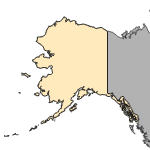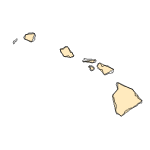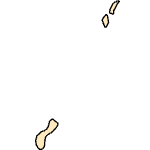Lates mariae
(bigeye lates)
Fishes
Exotic |
|
Common name: bigeye lates
Taxonomy: available through
www.itis.gov
Identification: Howells 1992b.
Size: 500 g.
Native Range: Endemic to Lake Tanganyika, Africa (Robins et al. 1991b).



|

Alaska |

Hawaii |

Puerto Rico &
Virgin Islands |

Guam Saipan |
Hydrologic Unit Codes (HUCs) Explained
Interactive maps: Point Distribution Maps
Nonindigenous Occurrences:
Table 1. States with nonindigenous occurrences, the earliest and latest observations in each state, and the tally and names of HUCs with observations†. Names and dates are hyperlinked to their relevant specimen records. The list of references for all nonindigenous occurrences of Lates mariae are found here.
Table last updated 1/30/2026
† Populations may not be currently present.
Means of Introduction: Intentional stocking by the Texas Parks and Wildlife Department for sport fishing.
Status: All populations are now believed to be extirpated (Howells 1992a, 1992b).
Impact of Introduction: The impacts of this species are currently unknown, as no studies have been done to determine how it has affected ecosystems in the invaded range. The absence of data does not equate to lack of effects. It does, however, mean that research is required to evaluate effects before conclusions can be made.
References: (click for full references)
Howells, R. G. 1992a. Annotated list of introduced non-native fishes, mollusks, crustaceans and aquatic plants in Texas waters. Texas Parks and Wildlife Department, Management Data Series 78, Austin, TX. 19 pp.
Howells, R. G. 1992b. Guide to identification of harmful and potentially harmful fishes, shellfishes and aquatic plants prohibited in Texas. Texas Parks and Wildlife Department Special Publication, Austin, TX. 182 pp. (+ appendices).
Howells, R. G., and G. P. Garrett. 1992. Status of some exotic sport fishes in Texas waters. Texas Journal of Science 44(3):317-324.
Robins, C. R., R. M. Bailey, C. E. Bond, J. R. Brooker, E. A. Lachner, R. N. Lea, and W. B. Scott. 1991b. World fishes important to North Americans exclusive of species from the continental waters of the United States and Canada. American Fisheries Society Special Publication 21. American Fisheries Society, Bethesda, MD. 243 pp.
Author:
Fuller, P.
Revision Date: 4/18/2006
Peer Review Date: 4/18/2006
Citation Information:
Fuller, P., 2026, Lates mariae Steindachner, 1909: U.S. Geological Survey, Nonindigenous Aquatic Species Database, Gainesville, FL, https://nas.er.usgs.gov/Queries/FactSheet.aspx?SpeciesID=411, Revision Date: 4/18/2006, Peer Review Date: 4/18/2006, Access Date: 1/31/2026
This information is preliminary or provisional and is subject to revision. It is being provided to meet the need for timely best science. The information has not received final approval by the U.S. Geological Survey (USGS) and is provided on the condition that neither the USGS nor the U.S. Government shall be held liable for any damages resulting from the authorized or unauthorized use of the information.